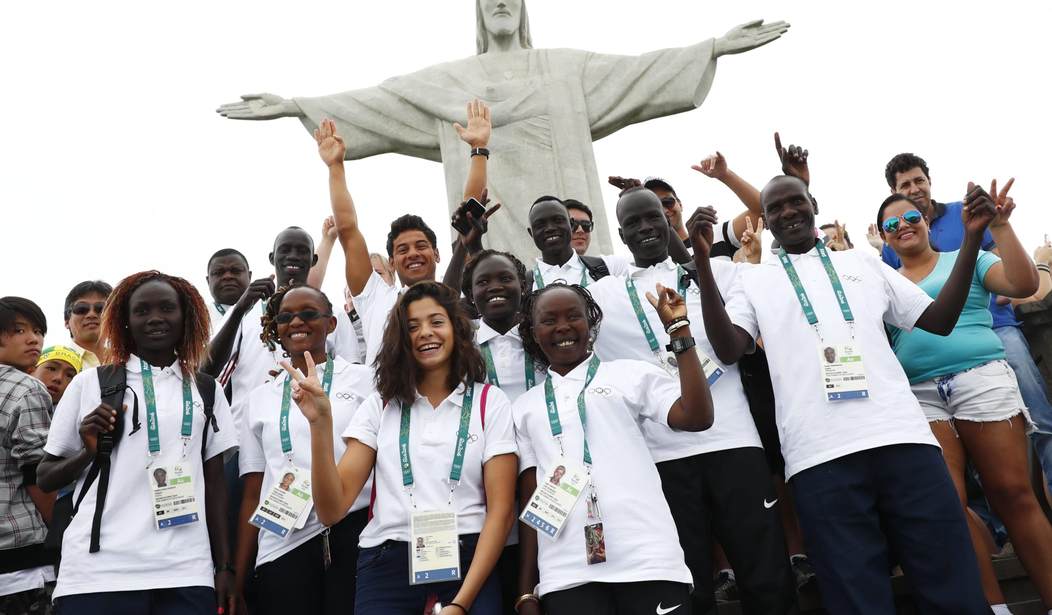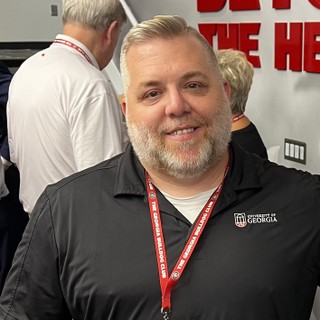This year’s Olympic Games in Rio have had their share of problems – or should we call them #RioProblems? From sewage in the water, to body parts washing ashore, to crime, to Zika fears, these Games have had their share of controversy.
Maybe Rio can use some good news. This year’s Olympic Games feature a team of ten competitors who are athletes without a nation. In March, the International Olympic Committee established a team of refugees with the goal of serving as “a symbol of hope for all the refugees in our world, and will make the world better aware of the magnitude of this crisis,” in the words of IOC president Thomas Bach, who also said, “These refugee athletes will show the world that, despite the unimaginable tragedies they have faced, anyone can contribute to society through their talent, skills and strength of the human spirit.”
James Chiengjiek
Country of origin: South Sudan
James Nyang Chiengjiek fled South Sudan at the age of 13 to escape insurgents who were recruiting child solders. At the age of 28, instead of running away, Chiengjiek is running for gold after training in a refugee camp in Kenya. Chiengjiek knows that his story can inspire. “My dream is to get good results at the Olympics and also to help people. Because I have been supported by someone, I also want to support someone,” he says. “If some of us get the chance to go to Rio then you have to look back to see where your brothers and sisters are. Given the chance, you have to utilise it in the right way.”
Rose Lokonyen
Country of origin: South Sudan
At 23, Rose Nathike Lokonyen has spent 13 years in a refugee camp in Kenya where, up until recently, she ran barefoot and had never competed. Her parents returned to Sudan eight years ago, but they left Rose and her siblings in Kenya, where she trained and tried out with the Tegla Loroupe Peace Foundation. “I started running when I was in high school. I love running and now it is my career,” Lokonyen says. And as her star begins to rise, she has a plan to use the Olympics to help her loved ones and others like her. “My dream, my first priority, is to help my parents and my siblings and then after that to help my fellow refugees.” Lokonyen carried the flag for her team of refugees during the opening ceremonies.
Paulo Lokoro
Country of origin: South Sudan
Paulo Amotun Lokoro grew up herding cattle for his family until the Sudanese civil war drove his parents to nearby Kenya a dozen years ago. Lokoro, now 24, lived with his uncle until the violence became unbearable. “The war started so we ran away. We ran to the bush and stayed in the bush. There was no food, we just ate fruit,” says Lokoro. In Kenya, he discovered a passion for running – a passion that has led him to Rio. “Before I came here I didn’t even have shoes. Now we have trained and trained until we see ourselves at a good level, and now we know fully how to be athletes,” Lokoro says, and he has set his hopes high. “A dream would be to break a record. To win a medal, a gold, that is my dream,” he says.
Anjelina Lohalith
Country of origin: South Sudan
Anjelina Nadai Lohalith has not seen her parents in a decade and a half. She arrived in Kenya in 2002 among thousands of displaced children. The fierce competitor with the winning smile didn’t realize how well she was at running until she was picked to train with Tegla Loroupe. “It came as a surprise,” she says. “When I was in primary school I used to do it for fun. But during the selection it was just like a trial, but suddenly they say ‘you will be going for training here.’” Lohalith’s Olympic dream is to reunite with her parents. “If I succeed I might earn some money to improve the life of my family. My dream is just to help my parents and help my father build a better house.”
Yiech Biel
Country of origin: South Sudan
Yiech Pur Biel‘s story echoes that of so many others of the “Lost Boys of Sudan.” Biel fled his home country when he was only 10 years old and made his way to Kenya, where he has spent a dozen years in a refugee camp.
In Kenya, he began to train for a path that would eventually lead him to Rio, but that training wasn’t easy. “In the refugee camp, we have no facilities – even shoes we don’t have,” Biel says. “There is no gym. Even the weather does not favor training because from morning until evening it is sunny and hot.”
The difficulties of refugee life along with harsh, unforgiving training conditions have not dampened Biel’s spirits, however. “I can show to my fellow refugees that they have a chance and a hope in life,” he says with a glimmer of hope in his eyes.
Yonas Kinde
Country of origin: Ethiopia
Yonas Kinde gets emotional when he talks about having to leave his home country of Ethiopia five years ago. Since 2013, he has lived under special protection in Luxembourg, where he works as a cab driver.
Kinde, 36, is also an accomplished marathon runner, having competed in several races across Europe, but because of his refugee status, he has been unable to compete in major international competitions. Until now.
“I’ve won many races but I didn’t have a nationality to participate in the Olympic Games or the European championships,” Kinde says. “It’s very good news for refugee athletes that Olympic Solidarity have given us this chance to participate here.”
Popole Misenga
Country of origin: Democratic Republic of Congo
Popole Misenga isn’t ashamed to let the tears flow. Fifteen years ago, the now 24-year-old Misenga fled his hometown of Kisangani, in the country formerly known as Zaire, where he hid alone in the woods for over a week before being rescued.
Growing up apart from family during his formative years, Misenga found the discipline he needed in judo. He began competing internationally and in 2013 defected to Brazil, where he makes his home. Misenga sees the Refugee Olympic Team as an opportunity to spread hope to refugees everywhere, but he also views the Games as a chance at a reunion.
“I have two brothers and I haven’t seen them,” explained Misenga, who has settled in Brazil. “I don’t know how they look anymore because we were separated since we were small. So I send hugs and kisses to my brothers.”
Rubbing tears from his eyes, the 24-year-old athlete delivered a message for his family: “If you can see me on television now, you can see that your brother is here in Brazil and alive and well.”
Yolande Mabika
Country of origin: Democratic Republic of Congo
Like her teammate, Popole Misenga, Yolande Mabika grew up in the war torn Democratic Republic of Congo, was separated from her family at a young age, and sought solace and discipline in judo.
“Judo never gave me money, but it gave me a strong heart. I got separated from my family and used to cry a lot. I started judo to have a better life,” she says.
Mabika sought asylum in Brazil with Misenga in 2013, during an international competition, and she never looked back. She has had to work hard to support herself without giving up on her dreams of gold.
The chance to compete in the Rio Olympics has allowed Mabika to be a source of light and hope to refugees across the globe. “My message to the refugees of the world would be not to give up on hope and to keep believing, to have faith in their hearts,” she says.
Rami Anis
Country of origin: Syria
By now, we can all trace the route: Syrian refugees flee their home country, pass through Turkey and Greece, and enter Europe. Five years ago, Rami Anis, then 20, escaped Aleppo for Turkey, thinking he would only be there for a couple of months.
Anis comes from a long line of competitive swimmers, but because he was from Syria, he could not swim in European competitions. He eventually made his way to Belgium, where he trains with champion swimmers and, despite the difficulties of not being a European citizen, is finally able to compete on an international level in Rio.
“It will be a great feeling to be part of the Olympics,” Anis says. “It is the biggest event in the world. I will be very proud because I will compete with world champions.”
Yusra Mardini
Country of origin: Syria
Most 18-year-olds spend their summer getting ready for the next chapter in their lives: college, career, military service. Yusra Mardini, on the other hand, has spent her summer getting ready to compete on the world stage.
Then again, most 18-year-olds don’t have to escape their homeland due to civil war. Mardini’s story takes a heroic turn, as she, her sister Sarah, and two other refugees plunged into the Aegean Sea to save the lives of their fellow migrants when the dinghy they set out in collapsed. The Mardini sisters made it safely to Germany.
In Rio, Mardini aims to “show the world ‘refugee’ is not a bad word.”
“I remember that without swimming I would never be alive,” she says. “Sometimes, it’s hard, but it’s amazing to feel like you have been an inspiration for everyone.”
—
These ten competitors without a home country just might be the most inspirational athletes at this year’s Olympic Games. It should be fun to see them all defy the odds and compete on the world’s largest stage.










Join the conversation as a VIP Member